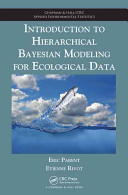

Most ebook files are in PDF format, so you can easily read them using various software such as Foxit Reader or directly on the Google Chrome browser.
Some ebook files are released by publishers in other formats such as .awz, .mobi, .epub, .fb2, etc. You may need to install specific software to read these formats on mobile/PC, such as Calibre.
Please read the tutorial at this link: https://ebookbell.com/faq
We offer FREE conversion to the popular formats you request; however, this may take some time. Therefore, right after payment, please email us, and we will try to provide the service as quickly as possible.
For some exceptional file formats or broken links (if any), please refrain from opening any disputes. Instead, email us first, and we will try to assist within a maximum of 6 hours.
EbookBell Team

5.0
70 reviewsMaking statistical modeling and inference more accessible to ecologists and related scientists, Introduction to Hierarchical Bayesian Modeling for Ecological Datagives readers a flexible and effective framework to learn about complex ecological processes from various sources of data. It also helps readers get started on building their own statistical models.
The text begins with simple models that progressively become more complex and realistic through explanatory covariates and intermediate hidden states variables. When fitting the models to data, the authors gradually present the concepts and techniques of the Bayesian paradigm from a practical point of view using real case studies. They emphasize how hierarchical Bayesian modeling supports multidimensional models involving complex interactions between parameters and latent variables. Data sets, exercises, and R and WinBUGS codes are available on the authors’ website.
This book shows how Bayesian statistical modeling provides an intuitive way to organize data, test ideas, investigate competing hypotheses, and assess degrees of confidence of predictions. It also illustrates how conditional reasoning can dismantle a complex reality into more understandable pieces. As conditional reasoning is intimately linked with Bayesian thinking, considering hierarchical models within the Bayesian setting offers a unified and coherent framework for modeling, estimation, and prediction.